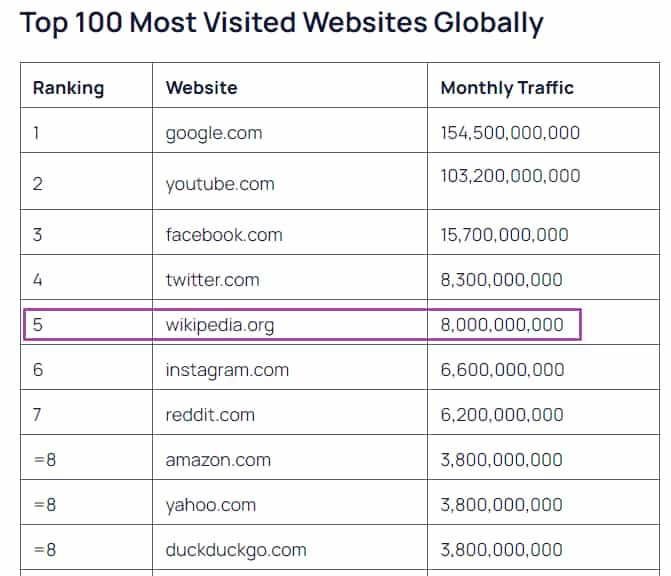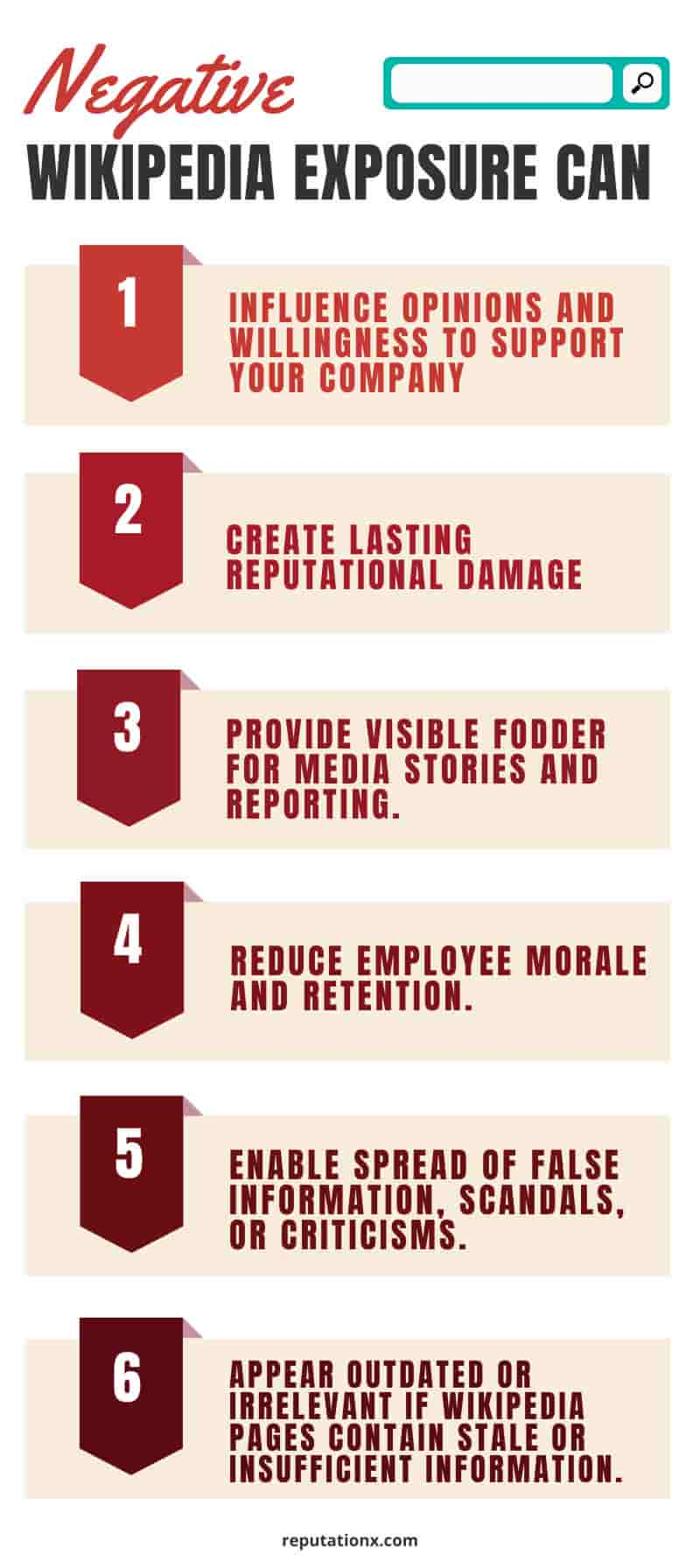How Wikipedia Shapes Online Reputation Far Beyond Search
Wikipedia is highly visible in search results. It is often in the second position of Google results for major brands. Wikipedias’ high visibility makes it an important piece of the reputation pie. Because anyone can edit Wikipedia, it can both help and harm an online brand.
This article will cover:
- How Wikipedia can help boost your company’s credibility and reputation
- The impact of negative information on a Wikipedia page on your online reputation
- Best practices for creating and maintaining a Wikipedia page
With over 6 million articles in English alone, Wikipedia has become one of the most visited websites globally. Because it is so visible, your presence on Wikipedia will determine your online reputation.
- With 8 billion monthly visitors, Wikipedia dominates search engine results pages
- Wikipedia, as one of the most popular and authoritative websites globally, holds significant power in shaping public perception.
- The content on your Wikipedia page will determine your company’s credibility, visibility, and search rankings.
Wikipedia’s non-profit status and strict neutrality standards instill high levels of trust among readers. This presents a major opportunity for shaping your company’s narrative.
However, promoting your brand through biased or promotional Wikipedia entries violates the platform’s conflict of interest guidelines. Providing accurate, neutral information through credible third parties offers opportunities to boost brand equity.
How influential is Wikipedia?
Here are a few facts and statistics that demonstrate Wikipedia’s immense influence:
- Wikipedia is the 5th most visited website globally, with over 7 billion monthly visitors. With detailed entries on millions of topics, it has become a go-to resource for information.
- Wikipedia appears on page 1 of Google for 99% of searches.
- 72% of Wikipedia traffic comes from Google searches.
For many people, Wikipedia is the first place they turn to learn about a company, public figure, product or event. This means that Wikipedia has significant power in shaping reputations and public perception.
At the time of this writing, Wikipedia is the fifth most often visited website in the world.

How Wikipedia can help boost your company’s credibility and reputation
An accurate Wikipedia page can improve your company’s credibility, and visibility, and better tell your brand story.
Wikipedia ranks extremely well in search engines, given its popularity and citation of sources.
This means a Wikipedia profile for your company or executives will frequently appear at the top of Google results. As up to 71% of people click the first Google search result, prominent Wikipedia placement can provide massive brand visibility.
Ready to Take the Next Step?
Get in touch with our team and we’ll take the first steps toward building a reputation repair campaign.
Talk with UsWikipedia is trusted
Beyond search engine optimization (SEO), Wikipedia lends credibility as an independent, user-generated source. The platform’s non-commercial nature adds to its trustworthiness.
Including well-sourced content and external references boosts credibility further. Wikipedia’s community of editors values transparency, factual accuracy and citations. Linking to reputable publications suggests validity to the information provided.
Benefits of a Wikipedia page
Here are some benefits of having a positive or neutral Wikipedia page:
- Increased brand awareness and discovery via Wikipedia’s high search engine rankings and vast readership.
- Added credibility, prestige, and trustworthiness by appearing accurately on a high-authority platform.
- Positioning your company and leadership as industry experts and thought leaders.
Avoid self-promotion on Wikipedia
Remember that Wikipedia is not a place to market your company. It is an encyclopedia, so avoid overt self-promotion by maintaining a neutral point of view. Not abiding by this guideline will almost certainly mean unwelcome edits to your Wikipedia article. Here’s what we mean by non-promotional content:
- All information is backed by high-quality, 3rd party sources.
- Press releases and posts on your company website won’t cut it on Wikipedia because they can be controlled by the brand.
- Information sourced on Wikipedia must be on a reputable website like the Wall Street Journal, Entrepreneur, well-known university, scholarly articles, etc.
Any information on your Wikipedia page will rank high in Google searches. Wikipedia is somewhere on the first page of Google search results most of the time.
In summary, a strong Wikipedia presence allows you to showcase your company and offerings in the best possible light across a platform with global reach and significant influence.
The impact of negative information on a Wikipedia page on your online reputation
Despite policies prohibiting falsehoods, Wikipedia does present reputation risks from biased, misleading, or malicious edits. Pages with scandals, controversies, or criticism highlighted prominently can undermine your brand. The open editing model means anyone can add or change content, including competitors looking to cause trouble.
Vandalism and factual errors tend to get corrected over time, especially on high-traffic pages. But malicious content can still do temporary damage if spread elsewhere before fixes are made. Edit wars between favoring and critical information can also develop, reflecting poorly on your reputation.
Without monitoring, false claims or one-sided portrayals may linger. And even factually correct but negative information can disproportionately influence public opinion because of Wikipedia’s clout. There are no guarantees that fairness filters will prevail, so risks to reputation remain.
Specifically, negative Wikipedia exposure can:
- Influence consumer and B2B partner opinions and willingness to purchase products/services.
- Create lasting reputational damage that becomes strongly attached to your brand in search engines.
- Provide visible fodder for media stories and reporting, resulting in further reputational damage.
- Reduce employee morale and retention if they perceive the company has a damaged public image.
- Enable spread of false information, scandals, or criticisms which are then amplified through Wikipedia’s immense reach.
- Position the company as outdated or irrelevant if Wikipedia pages contain stale or insufficient information.

One of the biggest problems with having negative information on your Wikipedia page is that Wikipedia will actually strengthen any negative articles that are linked on the page. Since Wikipedia is such a strong site and is updated frequently, it will effectively create more “link juice” to negative articles.
Best practices for creating and maintaining a Wikipedia page
Not every person or company is notable enough to have a Wikipedia page. If your company doesn’t have neutral notable, 3rd party sources about it, then it’s not time to start working on a Wikipedia page.
Check out Wikipedia’s notability guidelines to see what it takes to create a new Wikipedia page.
If you submit an article that sounds like it was written by someone affiliated with your company, or that is not well-sourced, it will be rejected.
Keep in mind that there is a lot of risk involved with Wikipedia page creation. Once your Wikipedia page is live, it can never be deleted.
You cannot control who edits it, either. Due to Wikipedia’s open-source editing model, anyone can edit your page. So if there are a lot of negative news articles about your company, the odds are high that they will make their way into your Wikipedia page.
If a Wikipedia page already exists about you or your company, here are a few best practices:
- Make credible information available on reputable 3rd party sources that align with Wikipedia’s editorial standards. There is a chance that this information will get added to your Wikipedia page organically.
- Consider working with experienced Wikipedia editors. Those with a strong editing history understand policies and can navigate the approval process more smoothly.
- Fix factual errors promptly and directly using Wikipedia’s editing system. Act in good faith according to policies. Ask for external source verification if unsure about contested points.
- Point interested third parties to gaps or areas for expansion in your company/products’ Wikipedia presence.
- Suggest edits to add positive developments about milestones, community outreach, recognitions, etc. to maintain a balanced perspective over time.
- Ensure executives and leadership have properly sourced biographical pages.
- Identify adjacent Wikipedia articles that could reasonably link to your company pages.
Dealing with Negative information on your Wikipedia page can be difficult. Since editing your own Wikipedia page is a conflict of interest, a better strategy is to collaborate with experienced Wikipedia editors.
Here are a few ways to deal with negative content on Wikipedia:
- Check that the verbiage on your Wikipedia page matches what is in the original source. If the content on your page can’t be found in the source, you may be able to rewrite or delete it entirely.
- Use Wikipedia’s dispute resolution system if needed. The community takes a dim view of factual distortions or maliciously added content.
- Familiarize yourself with Wikipedia’s guidelines. If there is activity on your page that violates these guidelines, consider communicating that on the article’s Talk page.
- Avoid self-promotional or sales-focused messaging when editing Wikipedia. Focus on informing.
- Monitor your page regularly for vandalism, bias, or newly added negative content. Sign up for page alerts. Follow the talk page for disputes.
In summary, take an informative, helpful approach while respecting Wikipedia’s standards. Enhance your presence through credible third parties instead of self-promotion.
Final thoughts
Wikipedia has a significant influence on shaping people’s and organizations’ online reputations. As one of the most visited websites globally, Wikipedia articles tend to rank highly in search engine results. This means the information presented on Wikipedia can be the first impression many people form of a person, company, product etc.
While Wikipedia aims to provide neutral, factual information, there are still opportunities for bias, errors, or malicious edits. The open editing model allows anyone to potentially add or change content. Those looking to intentionally damage reputations can exploit this, even if falsehoods are eventually removed.
Overall, having a well-written, objective Wikipedia page can boost online visibility and credibility. But the open-source nature means reputations are vulnerable there too. Monitoring and updating Wikipedia over time is advised, as is proactively contributing high-quality content. With care and effort, Wikipedia can be an asset rather than a liability when managing online reputation.
About the author
Brianne Schaer is a Writer and Editor for Reputation X, an award-winning online reputation management services agency based in California. Brianne has more than seven years of experience creating powerful stories, how-to documentation, SEO articles, and Wikipedia content for brands and individuals. When she’s not battling AI content bots, she is cruising around town in her Karmann Ghia. You can see more of her articles here and here.
Ready to Take the Next Step?
Get in touch with our team and we’ll take the first steps toward building a reputation repair campaign.
Talk with Us
–
